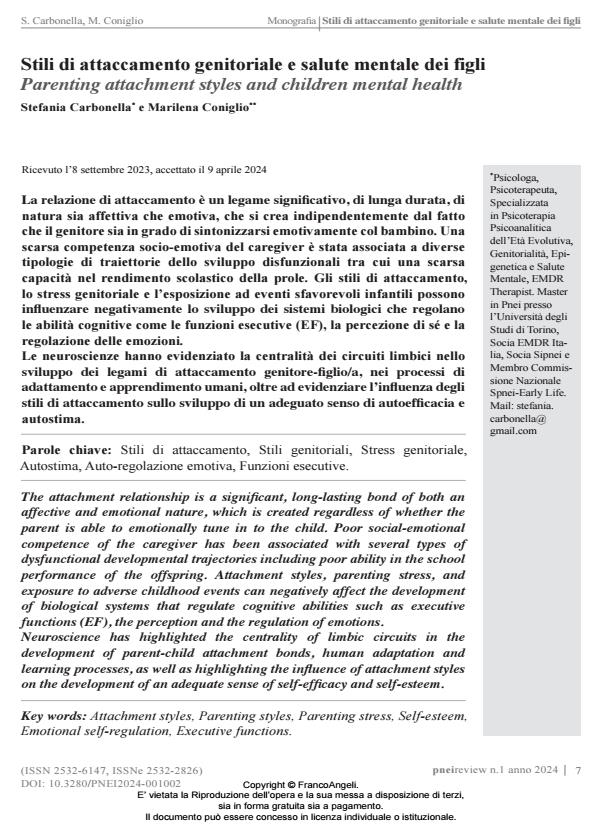Stili di attaccamento genitoriale e salute mentale dei figli
Titolo Rivista PNEI REVIEW
Autori/Curatori Stefania Carbonella, Marilena Coniglio
Anno di pubblicazione 2024 Fascicolo 2024/1
Lingua Italiano Numero pagine 15 P. 7-21 Dimensione file 1143 KB
DOI 10.3280/PNEI2024-001002
Il DOI è il codice a barre della proprietà intellettuale: per saperne di più
clicca qui
Qui sotto puoi vedere in anteprima la prima pagina di questo articolo.
Se questo articolo ti interessa, lo puoi acquistare (e scaricare in formato pdf) seguendo le facili indicazioni per acquistare il download credit. Acquista Download Credits per scaricare questo Articolo in formato PDF

FrancoAngeli è membro della Publishers International Linking Association, Inc (PILA)associazione indipendente e non profit per facilitare (attraverso i servizi tecnologici implementati da CrossRef.org) l’accesso degli studiosi ai contenuti digitali nelle pubblicazioni professionali e scientifiche
La relazione di attaccamento è un legame signi?cativo, di lunga durata, di natura sia affettiva che emotiva, che si crea indipendentemente dal fatto che il genitore sia in grado di sintonizzarsi emotivamente col bambino. Una scarsa competenza socio-emotiva del caregiver è stata associata a diverse tipologie di traiettorie dello sviluppo disfunzionali tra cui una scarsa capacità nel rendimento scolastico della prole. Gli stili di attaccamento, lo stress genitoriale e l’esposizione ad eventi sfavorevoli infantili possono in?uenzare negativamente lo sviluppo dei sistemi biologici che regolano le abilità cognitive come le funzioni esecutive (EF), la percezione di sé e la regolazione delle emozioni. Le neuroscienze hanno evidenziato la centralità dei circuiti limbici nello sviluppo dei legami di attaccamento genitore-?glio/a, nei processi di adattamento e apprendimento umani, oltre ad evidenziare l’in?uenza degli stili di attaccamento sullo sviluppo di un adeguato senso di autoef?cacia e autostima.�
Parole chiave:Stili di attaccamento, Stili genitoriali, Stress genitoriale, Autostima, Auto-regolazione emotiva, Funzioni esecutive.
Stefania Carbonella, Marilena Coniglio, Stili di attaccamento genitoriale e salute mentale dei figli in "PNEI REVIEW" 1/2024, pp 7-21, DOI: 10.3280/PNEI2024-001002